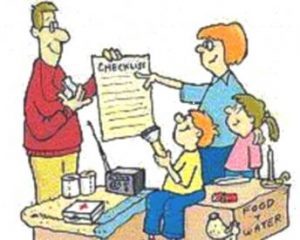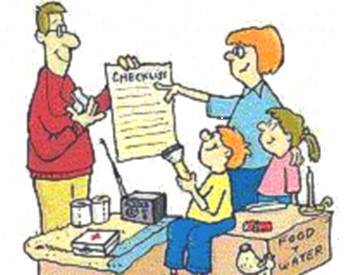 Preparedness and planning resources have been a main topic of conversation on this site for quite some time. Preparedness is worth investing time into in order to ensure the safety and security for yourself and your family. In addition to taking the necessary steps to prepare a household for emergencies, it’s also important to establish a plan for protecting your home and saving specific items. Since recent data shows intense weather being the most frequent and main cause of death, it could be anything from a hurricane, to a home break-in that impacts your family. Because of this, knowing what items will keep you safe and allow you to feel secure moving forward is absolutely crucial.
Preparedness and planning resources have been a main topic of conversation on this site for quite some time. Preparedness is worth investing time into in order to ensure the safety and security for yourself and your family. In addition to taking the necessary steps to prepare a household for emergencies, it’s also important to establish a plan for protecting your home and saving specific items. Since recent data shows intense weather being the most frequent and main cause of death, it could be anything from a hurricane, to a home break-in that impacts your family. Because of this, knowing what items will keep you safe and allow you to feel secure moving forward is absolutely crucial.
Here are some areas you need to focus on while developing an emergency preparedness plan:
First and foremost, make a plan
Having a plan written down will teach your family how to react at a moment’s notice. This will not only keep them safe, but it’ll also give them peace of mind knowing that they’re prepared to react. Your plan should set multiple rendezvous locations near and far away from your home in order to account for multiple types of emergencies. It should also establish emergency contacts such as family members, neighbors, friends, etc. Be sure to thoroughly go over the plan, especially with any young children, and make a point to revisit and/or revise your emergency plan once or twice a year. Here are some tips on how to make your own.
Purchase adequate supplies
Emergency kits are a great way to make sure that you and your family have all of the essential items during a disaster or in the event of an emergency. The kit should include enough items to last a few days, or even up to a week, and should be placed in multiple locations around the house or place of work. The items included should be everything from food and water (at least one gallon per person), power sources like batteries or generators, various tools, and clothing or blankets. Remember to account for anyone who may have specific medical requirements as well. Having an adequate emergency kit will allow you to care for yourself and others, while also avoiding having to go out into potentially dangerous conditions.
Invest in security
Home security systems are often the first step individuals and families take toward protecting their households, and for good reason. These systems can be the perfect layer of defense for yourself, your family, and all of your valued belongings. It’s important to look for an all-inclusive system that monitors activity around your doors and windows, but also protects you from a multitude of situations such as fire, carbon monoxide poisoning, and flooding. Even though it’s difficult to anticipate every disaster you may be susceptible to, it can be easy and affordable to take a few simple measures. Check out this page here for everything worth looking for if you’re considering investing in a home security system. Remember to look for comprehensive security systems that are easy to set up, offer 24/7 monitoring, and work in various environments. Allowing yourself a little peace of mind can definitely go a long way in terms of preparedness.
Safeguard your important documents
When disaster strikes or a family is caught in an emergency situation, many might think to save material things, if anything at all. However, there are a few items that are worth saving if you’re able to, or better yet, securely protecting from a disaster that could damage your belongings. Among the many things worth protecting, safeguarding personal documents and various forms of identification is incredibly important. Identification ranges from passports and driver’s licenses, to social security cards and birth certificates. This may seem like a small detail to some, but being able to produce proper identification can make or break your eligibility to receive medical treatment or relief aid. It could also greatly affect your ability to access transportation in the event of an evacuation.
Protecting financial information
Aside from the important documents mentioned above, protecting financial information is something to take very serious as well. Records such as emergency funds, investments, insurance policies, and wills are some that can be very difficult to replace. Whether a social security number is lost or stolen, or even sensitive financial records, this could put your family in a very vulnerable spot when it comes to identity theft. Not only could this affect you for several years, but it can cause extreme worry and discomfort, as well as have an immense impact on future financial security. Make sure you consider purchasing a fireproof safe or procuring a safety deposit box, and establish a family emergency fund that can last anywhere from three to eight months.

